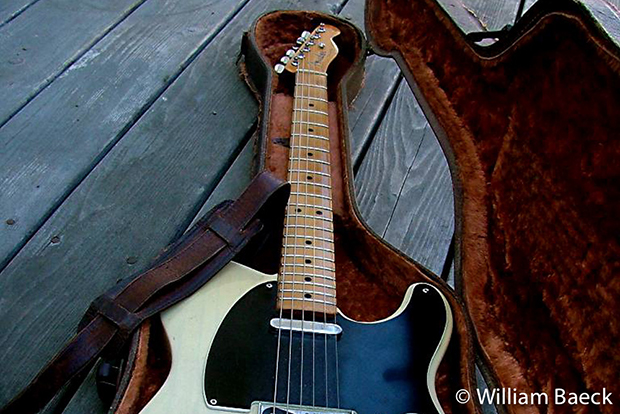The GAS Man: What’s the Story?

We are the storytelling species. It’s part of what creates and shapes our humanness.
But it’s not just ourselves we surround with stories, it’s things as well. Stories enable us to humanize objects and thereby imbue them with greater personal value.
When it comes to our guitars, the story behind each forms part of what we guitarists call its “mojo.”
Let’s take a simple example. Suppose you bought a guitar and then found out months later that its previous owner was one of your favorite guitarists. I suspect that guitar would suddenly become even more important to you. And in that way might well come to sound and play better to you. In guitar terms, its mojo would have increased.
The story is therefore part of its worth.
This applies to entire categories of guitars. Why would you buy a Les Paul? Maybe because it’s the best guitar in the shop. But partly, I’m guessing, it’s because of the history, the legacy, the story. This is the guitar of Les Paul, Eric Clapton, Jimmy Page and Slash. The iconic instrument behind songs like “Money for Nothing” and “Whole Lotta Love.”
Often it’s not just the type of guitar, it’s how you bought it that makes the story. Think of this as “The Story of the Hunt.” Maybe you got a great deal at your local BBGS (Big Box Guitar Store). We all love to say we got a bargain. Paradoxically, the opposite story applies as well. And here I’m talking to you, Mr. “I Just Dropped 10 Large on a Vintage Acoustic.”
Get The Pick Newsletter
All the latest guitar news, interviews, lessons, reviews, deals and more, direct to your inbox!
In the first case, it’s that we got a more valuable guitar than what we paid, which implies value added to the gear above its cost. In the second case, it’s coming right out and saying that because we paid so much, it must be that valuable. At least that’s the hope, right?
The type of story that adds value to our guitars can change over time. What detracts value to one generation might add value to the next. Let me show you what I mean.
Originally a new guitar was, quite logically, worth more than a used one. A used guitar was merely older and pre-owned—as indicated by the lower price tag. But at some point in the 1950s, players began seeking out certain older instruments—Martin and Gibson acoustics, for instance. They felt that the older models were better than what was currently being sold.
Not long after, the idea of a guitar or amp (or even pedal, eventually) being “vintage” acquired cache. It became a magical term. Vintage automatically added two stories—that it was better merely “used” and that it lead an interesting life before it came into your hands. We enjoyed imagining all the bars and stages and jams where it had been played.
Guitar manufacturers became aware of this, and they now offer both kinds of stories pre-made in new instruments, by issuing recreations not only of vintage models but of specific guitars played by various guitar heroes. Nowadays you can go to your local dealer and buy a brand-new guitar that has echoes of the stories of vintage and fame—at a sizable upcharge, naturally. Such is the cost of storytelling.
And of course, there are relic-ed guitars that imply their own stories of years of use.
But it’s the personal story I like best. The one intrinsic to that individual guitar that helps make it unique.
When I look at my own favorite pieces of gear, I can recall the story behind each one—where it came from and how I came to own it—from the ‘27 Martin that was a 40th birthday gift from my wife to the ‘66 Deluxe Reverb I bought from the proverbial trunk of a car.
But the story doesn’t end there.
If we allow that stories add value to our gear, then it’s worth noting that the story isn’t finished the day we buy that guitar or amp. In fact, for a new piece of equipment, it’s really just the first chapter. By playing it in all sorts of situations, it gains a history. Each recording a guitar was used on, that jam with friends, even the repaired headstock crack from where you tried to show off but ended up crashing into your drummer’s hi-hat, every time you make a memory with your guitar you add a story.
And that just makes your guitar more valuable. So go out and play. It’s story time.
William Baeck is a writer, photographer and hack guitarist living in London. You can check out his webpage at williambaeck.com and reach him on Facebook and Twitter.
"Upgrading from your entry-level acoustic opens the door to an entirely new world of tonewoods, body shapes, and brands": 6 signs it's time to upgrade from your first acoustic guitar
"I'm past my prime": 5 common excuses for not learning the guitar – and 5 body and mind-boosting reasons you should









